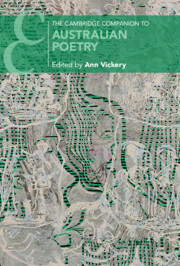Book contents
- The Cambridge Companion to Australian Poetry
- The Cambridge Companion to Australian Poetry
- Copyright page
- Contents
- Figures
- Contributors
- Acknowledgements
- Chronology
- Introduction
- Part I Change and Renewal
- Part II Networks
- 4 Above and Below
- 5 Romanticism, Sensibility, and Settler Women Poets
- 6 Experiment and Adaptation
- 7 The Post-war Golden Generation, 1945–1965
- 8 Generation of ’68 and a Culture of Revolution
- Part III Authors
- Part IV Embodied Poetics
- Part V Expanding Form
- Further Reading
- Index
- Cambridge Companions To …
- References
8 - Generation of ’68 and a Culture of Revolution
from Part II - Networks
Published online by Cambridge University Press: aN Invalid Date NaN
- The Cambridge Companion to Australian Poetry
- The Cambridge Companion to Australian Poetry
- Copyright page
- Contents
- Figures
- Contributors
- Acknowledgements
- Chronology
- Introduction
- Part I Change and Renewal
- Part II Networks
- 4 Above and Below
- 5 Romanticism, Sensibility, and Settler Women Poets
- 6 Experiment and Adaptation
- 7 The Post-war Golden Generation, 1945–1965
- 8 Generation of ’68 and a Culture of Revolution
- Part III Authors
- Part IV Embodied Poetics
- Part V Expanding Form
- Further Reading
- Index
- Cambridge Companions To …
- References
Summary
This chapter outlines how the 1970s brought radical expression, new explorations of poetic persona, and increasing belief in the poet’s role to advocate for rights and freedoms. It argues that anthologies seeking to capture the zeitgeist failed to do so, sometimes due to using frameworks borrowed from North America that elided local diversity. The chapter asserts that small press culture constituted a provisional, heterogeneous commons that undid traditional definitions of authorship and form, and offered a space to air the previously taboo. It traces the turn to America as well as to popular culture, other media, and documentary. Through an examination of Michael Dransfield’s reception, it demonstrates how umbrella terms delimit complex individual poetics while demonstrating affiliations in Dransfield’s self-examination with contemporaries like Pam Brown, Nigel Roberts, and Vicki Viidkikas. The chapter also considers the impact of the first anthology of women’s poetry, Mother, I’m Rooted. It redresses the elision of its editor, Kate Jennings, from other anthologies and critical framings of the period, as well as the marginalisation of Kevin Gilbert.
- Type
- Chapter
- Information
- The Cambridge Companion to Australian Poetry , pp. 134 - 150Publisher: Cambridge University PressPrint publication year: 2024



